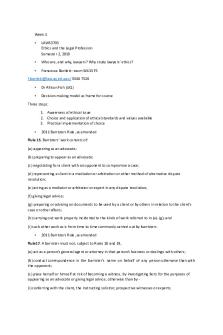Subset of Liberalism (Lecture notes) PDF

| Title | Subset of Liberalism (Lecture notes) |
|---|---|
| Course | Development and the State |
| Institution | University of Sussex |
| Pages | 2 |
| File Size | 61.3 KB |
| File Type | |
| Total Downloads | 172 |
| Total Views | 331 |
Summary
Subset of Liberalism Defining Characteristics/Figures Role of the State Role of Development Classical Liberal As discussed. General non-interference by the state. Limited to defence; administration of justice; provision of public goods. Guard against monopolies.Occurs naturally when equilibrium achi...
Description
Subset of Liberalism Classical Liberal
Defining Characteristics/Figures As discussed.
Role of the State General non-interference by the state. Limited to defence; administration of justice; provision of public goods. Guard against monopolies.
Liberal Internationalism
Idea that liberalism could also be beneficially applied to international sphere. (Kant; Doyle) Classical economic theory as applied to governance (Austrian School). Law of supply and demand.
Democracy would constrain warmaking by states b/c of costs incurred. Minimal. All goods (incl. Public, defence) are most efficiently provided through market. State involvement can only result in inefficiencies. Minimal. Protecting rights of individuals to not be interfered with.
Neo-classical Liberal
Libertarian
Each individual has the right (justice claim) to their own talents (Nozick). Total non-interference by others and by state. Inequality not unjust.
Social Democrat
Need to develop moral virtue in society (education). Education, social services essential for productive, effective society. Too much inequality can be destabilizing to society. (Fabians, Webbs, T.H.Green, Keynes)
Essential to provide public goods (education, health, infrastructure) – not in short-term interest of capitalists to provide these. Guard against monopoly capitalism. Redistributive role (benefits, pensions).
Role of Development Occurs naturally when equilibrium achieved. Everyone should pursue their own self-interest and in doing so public good is maximized (Mandeville, Smith). Geography is limiting, but labour adds value (Smith). Comparative Advantage of specialisation (Ricardo). Benefits of Free Trade would increase costs of war. Natural outgrowth of market mechanism.
Best served by individuals maximizing their given talents, skills.
Barriers to market mechanisms (imperfect information, transaction costs) mean that state has a role in both regulating and smoothing economy. Recognition of role that economy plays in peace and need to ensure smooth consumption and adequate saving. Reform movements also put forward moral arguments against slavery, colonialism,
exploitation. Other influences... Utilitarian
Pluralist
Communitarian
Most important to maximize the overall society good as aggregate of individual utility. This may mean sacrificing individual needs/wants. (Mill, Foot’s Trolley Car problem). Importance of groups as counterbalance to state. Epistemic Communities. Interest Group politics. Community is fundamental to society – constitutively and normatively (Rawl’s blindfold).
State’s role to ensure the greatest happiness for the most people.
According to greatest good.
Limited/no agency. Role is to manage groups. Ensure representation.
Not generally addressed.
Limited/Redistributive.
Not generally addressed....
Similar Free PDFs

Liberalism - Lecture notes 8
- 5 Pages

Ideologies: Liberalism
- 9 Pages

Liberalism key thinkers
- 3 Pages

Liberalism vs Realism
- 6 Pages

Law and Society - Liberalism
- 6 Pages

Modern American Liberalism
- 2 Pages

Subset 1(A) foureyes ans
- 11 Pages

Lecture Notes of COMP2300
- 42 Pages

Summary of lecture notes
- 4 Pages

Subset 2(A) foureyes ans
- 11 Pages
Popular Institutions
- Tinajero National High School - Annex
- Politeknik Caltex Riau
- Yokohama City University
- SGT University
- University of Al-Qadisiyah
- Divine Word College of Vigan
- Techniek College Rotterdam
- Universidade de Santiago
- Universiti Teknologi MARA Cawangan Johor Kampus Pasir Gudang
- Poltekkes Kemenkes Yogyakarta
- Baguio City National High School
- Colegio san marcos
- preparatoria uno
- Centro de Bachillerato Tecnológico Industrial y de Servicios No. 107
- Dalian Maritime University
- Quang Trung Secondary School
- Colegio Tecnológico en Informática
- Corporación Regional de Educación Superior
- Grupo CEDVA
- Dar Al Uloom University
- Centro de Estudios Preuniversitarios de la Universidad Nacional de Ingeniería
- 上智大学
- Aakash International School, Nuna Majara
- San Felipe Neri Catholic School
- Kang Chiao International School - New Taipei City
- Misamis Occidental National High School
- Institución Educativa Escuela Normal Juan Ladrilleros
- Kolehiyo ng Pantukan
- Batanes State College
- Instituto Continental
- Sekolah Menengah Kejuruan Kesehatan Kaltara (Tarakan)
- Colegio de La Inmaculada Concepcion - Cebu





